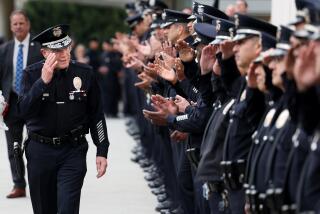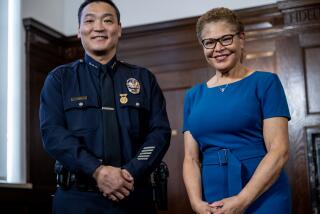Lessons From ‘The Organization Man’ Still Have Some Relevance for Today
- Share via
William H. Whyte Jr., who died Jan. 12 at age 81, painted this picture of loyal, committed, hard-working managers:
“They are the ones of our middle class who have left home, spiritually as well as physically, to take the vows of organization life, and it is they who are the mind and soul of our great self-perpetuating institutions. . . . They have not joined together into a recognizable elite--our country does not stand still long enough for that--but it is from their ranks that are coming most of the first and second echelons of our leadership, and it is their values which will set the American temper.”
That was in 1956, when Whyte’s landmark “The Organization Man” was published. His book delved into the lives of middle-class men who worked for large companies and commuted to their suburban houses and stay-at-home wives in Park Forest, Ill.--a “packaged village,” in Whyte’s parlance.
Written a year after Sloane Wilson’s novel “The Man in the Gray Flannel Suit” illustrated the quiet despair among white-collar professionals, the book sounded an alarm about spreading conformity in post-World War II America. The trend pervaded not just business but also academic and scientific institutions, Whyte wrote.
Whyte’s death has raised anew the debate among economists and sociologists about whether his observations have any relevance today.
In the view of Warren M. Bennis, a USC management professor and authority on leadership, the book’s messages still apply.
“In the heyday of ‘Organization Man,’ corporate America was monotonously homogeneous,” Bennis said. “I remember the book well and felt at the time and now that it was chillingly accurate.”
Jay W. Lorsch, a professor of human relations at Harvard Business School, agrees that Whyte “certainly coined a word and captured something, a very apt description of where we were at a particular point in time.” Maybe it didn’t change anything, but it made a point.
Times were much more predictable then, before civil rights, the women’s movement and affirmative action shook up the workplace, and before entrepreneurship became a way of life for much of the nation. American industry today is a far more heterogeneous and complex institution, and even such behemoths as General Electric Co. and Hewlett-Packard Co. now emphasize agility, speedy response and “intrapreneurial” activity.
*
The book described an important era of U.S. organizations and the character of the men--and they were, of course, almost exclusively men--who held power during the Eisenhower years.
The corporate chieftains of the period were molded by and benefited from their military experience. Having fought a “good war,” they were embraced by an adoring public upon their return. Having come of age during the Depression, they were eager for prosperity, security and stability.
Determined to survive in the workplace, they submerged personal ambition and individualism in favor of corporate conformity. They accepted geographic transfers without complaint, willingly becoming interchangeable parts in the corporate machine.
Much has shifted in the four decades since Whyte limned the risk-averse males who craved a sense of belonging to a common corporate cause.
At Harvard, Lorsch said, students in the 1950s eagerly sought jobs with Fortune 500 companies. Today, he added, “the better students don’t want to go near them. They want to make money quickly in finance or venture capital or consulting or start-ups.”
*
Instead of being loyal and committed to the corporation, workers made skittish by years of downsizing and restructuring are now focused on their own careers and accomplishments. Changes in pension systems have made these workers much more mobile--free agents, as it were. Perhaps most important, it would be ludicrous now to talk of an “organization man,” given the diversity of the modern work force.
In response to the changes in society and the global marketplace, organizations are once again “trying to take advantage of the unique contributions of people,” said Theresa M. Welbourne, a professor of human resource studies at Cornell University in Ithaca, N.Y. Change, she noted, “has become the new edict” in corporate America.
Welbourne, who hasn’t looked at “The Organization Man” in years, uses as a textbook “The Individualized Corporation” by Sumantra Ghoshal and Christopher Bartlett (HarperBusiness, 1997) that would seem a perfect counterpoint.
Yet Whyte’s classic, she said, holds many lessons for workers today. Consider the recent rash of mega-mergers that are creating new business giants. Though not necessarily bad, she said, big companies can provide a hospitable climate for the deadening culture that afflicted Whyte’s organization men.
“If you get big at the expense of being able to take advantage of the knowledge of workers,” she said, “you won’t be able to compete effectively.”
Has your company undone a merger because of a culture clash? Tell us about it. Write to Martha Groves, Corporate Currents, Business Section, Los Angeles Times, Times Mirror Square, Los Angeles, CA 90053, or e-mail martha.groves@latimes.com.
More to Read
Sign up for our Book Club newsletter
Get the latest news, events and more from the Los Angeles Times Book Club, and help us get L.A. reading and talking.
You may occasionally receive promotional content from the Los Angeles Times.







